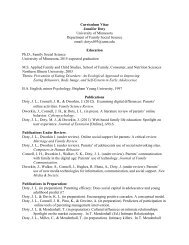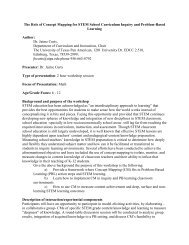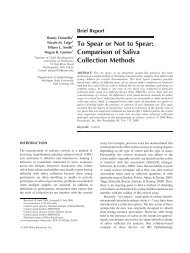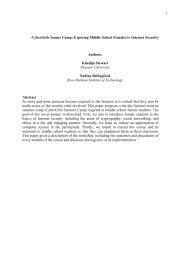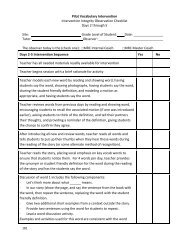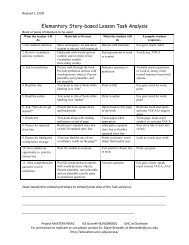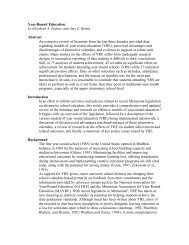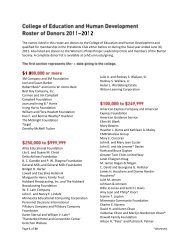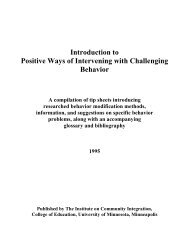Trauma and the Developing Brain - College of Education & Human ...
Trauma and the Developing Brain - College of Education & Human ...
Trauma and the Developing Brain - College of Education & Human ...
You also want an ePaper? Increase the reach of your titles
YUMPU automatically turns print PDFs into web optimized ePapers that Google loves.
H<strong>and</strong>out for <strong>Trauma</strong>, The <strong>Developing</strong> <strong>Brain</strong>, Healing <strong>and</strong> Emotional Regulation Seminars<br />
Karina A. Forrest-‐Perkins MHR LADC, 2011<br />
meaning in <strong>the</strong>ir lives. But for some people, <strong>the</strong> symptoms <strong>and</strong> disturbing reactions persist or<br />
even worsen. This can lead people to find ways to cope that are not so helpful, such as<br />
withdrawing from friends <strong>and</strong> family, using drugs or alcohol, or avoiding activities that are<br />
empowering. It is important to consider seeking help if important areas <strong>of</strong> life, such as<br />
relationships, work, or school, are being affected by traumatic stress. Likewise, people who<br />
become more <strong>and</strong> more depressed or anxious or for whom <strong>the</strong> use <strong>of</strong> alcohol or o<strong>the</strong>r drugs<br />
increases significantly may need treatment. Some traumatized people speak over <strong>and</strong> over<br />
about traumatic events without relief <strong>of</strong> symptoms. These people may benefit from treatment.<br />
Treatment options<br />
There are many types <strong>of</strong> treatment for traumatic stress, from individual <strong>the</strong>rapy to support<br />
groups. Interpersonal, relational, <strong>and</strong> psychodynamic psycho<strong>the</strong>rapies, which focus on <strong>the</strong><br />
meaning <strong>of</strong> trauma <strong>and</strong> how it has affected relationships, may help people underst<strong>and</strong> <strong>the</strong><br />
source <strong>of</strong> <strong>the</strong>ir current problems <strong>and</strong> how <strong>the</strong>se relate to <strong>the</strong>ir traumatic experiences. For<br />
some, medication can be effective. Also, anxiety management, cognitive <strong>the</strong>rapy (focusing on<br />
thoughts <strong>and</strong> beliefs), <strong>and</strong> exposure <strong>the</strong>rapy (helping <strong>the</strong> person confront painful memories <strong>and</strong><br />
situations that are realistically safe although still frightening, through talking about or imagining<br />
<strong>the</strong>m) are helpful for reducing PTSD <strong>and</strong> related reactions. A combination <strong>of</strong> psycho<strong>the</strong>rapy <strong>and</strong><br />
medication is <strong>of</strong>ten helpful for depression <strong>and</strong> anxiety following traumatic experiences.<br />
No single treatment is effective for everyone, <strong>and</strong> it may take time to find <strong>the</strong> right treatment.<br />
There also may be difficult periods in any treatment. Therefore, it is important to find a trained<br />
psycho<strong>the</strong>rapist or physician, preferably one with experience treating people with traumatic<br />
stress, who can work toge<strong>the</strong>r with <strong>the</strong> survivor to find a treatment approach that makes sense<br />
for <strong>the</strong> individual. A comfort with language, cultural considerations, <strong>and</strong> style <strong>of</strong> expression may<br />
enhance rapport in treatment.<br />
Where to go for help<br />
For people who wish to consider psycho<strong>the</strong>rapy, a family doctor, clergy person, local mental<br />
health association, state psychiatric, psychological, or social work association, or health insurer<br />
may be helpful in providing a referral to a counselor or <strong>the</strong>rapist with experience in treating<br />
people affected by traumatic stress.<br />
For more information about traumatic stress or <strong>the</strong> International Society for <strong>Trauma</strong>tic Stress<br />
Studies, call 847-‐480-‐9028.<br />
Brief Checklist <strong>of</strong> <strong>Trauma</strong> Symptoms<br />
Check <strong>the</strong> symptoms below that you experience (that may or may not be related to a traumatic<br />
event) <strong>and</strong> make notes as needed:<br />
29



